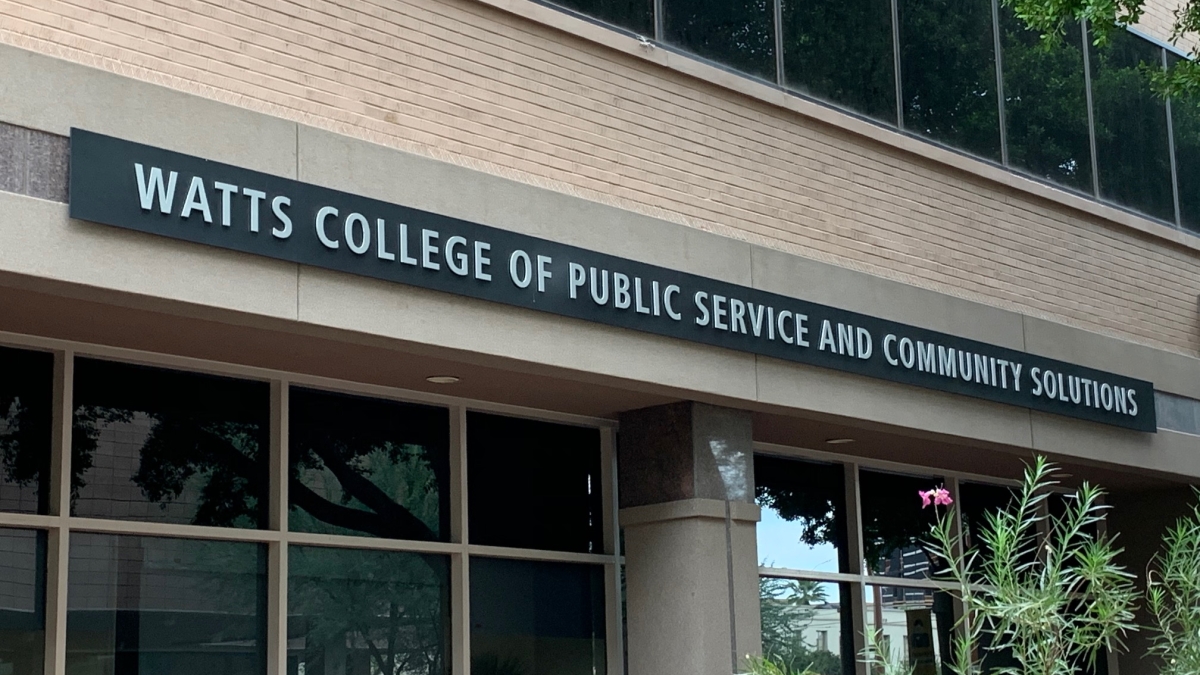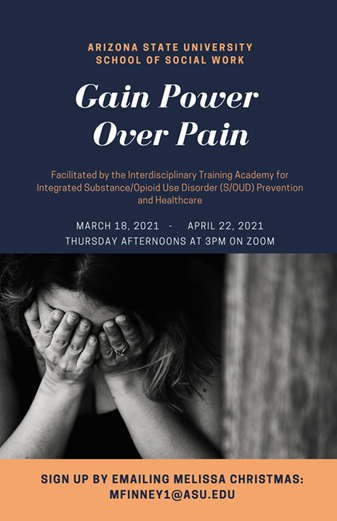‘Gain Power Over Pain' program aims to address opioid epidemic through preventive efforts

For many, managing chronic pain means getting a prescription for some form of opioid medicine, despite the documented risks. According to the U.S. Department of Health and Human Services, two out of three drug overdose deaths in the United States in 2018 involved an opioid.
But alternatives to opioids exist, said Associate Professor Natasha Mendoza of the School of Social Work at Arizona State University. A curriculum created by the Center for Applied Behavioral Health Policy at the school gives community members options for alleviating chronic pain that don’t involve pills.
Gain Power Over Pain (GPOP) aims to impact the opioid crisis through preventive, evidence-based efforts related to chronic pain.
“The GPOP programming does not suggest patients should not medicate their pain. To do so would be completely inappropriate and outside the scope of our expertise. But, perhaps we can offer a complement to the management of chronic pain. Ultimately, managing chronic pain should be a collaboration between a primary care provider and her or his patient,” said Mendoza, center director. “The GPOP programming is really a means of assisting people who have chronic pain with understanding how they can be mindful and address their chronic pain (in part) through their own thought processes, so we offer some techniques to do that.”
Some of the techniques utilized by GPOP, which is conducted entirely on Zoom, include mindfulness and meditation.
“I have seen the impact that chronic pain can have on an individual’s quality of life,” said GPOP facilitator and psychiatric nurse practitioner Melissa Christmas. “The GPOP program addresses the important topics of SMART goal setting, approaching activity, relaxation skills, healthy mood, sleep and mindfulness as they relate to chronic pain.” SMART goals are ones that are specific, measurable, attainable, realistic and time-bound.
GPOP has offered learning opportunities for its facilitators as they teach people how to manage their chronic pain.
These facilitators are students from the Interdisciplinary Training Academy, which is funded through a grant from the U.S. Health Resources and Services Administration, with Mendoza as the principal investigator. The academy trains Master of Social Work students, doctoral students, nurse practitioner students, nursing students and psychology postdoctoral professionals.

This flyer promoted last spring's Gain Power Over Pain program. New sessions are planned for this fall. Courtesy ASU School of Social Work
Mendoza said the academy’s focus is to positively impact the opioid crisis, gearing its training efforts toward creating behavioral health practitioners who can address the epidemic.
These students are exposed to different kinds of behavioral health work: They visit treatment centers, participate in community prevention efforts, learn about policy and harm-reduction efforts (such as needle distribution) and get the opportunity to facilitate learning sessions such as GPOP.
The GPOP program, which was originally intended for residents of the former Westward Ho hotel in downtown Phoenix, was recently opened to anyone age 18 or older.
The last session ended April 22, but others are expected to be held in the fall semester. Those who would like more information on the fall sessions may email Mendoza at Tadoza@asu.edu.
“The GPOP program is a free resource that offers engaging information sessions. Information presented is aimed at building skills that will improve the quality of life for individuals living with chronic pain,” Christmas said. “Please consider engaging in this helpful free resource if chronic pain is a concern in your life.”
The Center for Applied Behavioral Health Policy is based at ASU's Watts College for Public Service and Community Solutions.
Written by Morgan Carden, marketing communications, ASU School of Social Work.
More Health and medicine

Dynamic data duo advances health research
The latest health research promises futuristic treatments, from cancer vaccines to bioengineered organs for transplants to medical nanobots. While these technologies may one day be…

New study reveals high levels of toxins in seized cannabis from Arizona and California
A recent study conducted by researchers from Arizona State University has uncovered alarming levels of Fusarium mycotoxins in illicit cannabis samples seized in Arizona and California.The study found…

PhD student builds bridges with construction industry to prevent heat-related illnesses
It is no secret that Arizona State University has innovative researchers working to help solve everyday problems.According to a new preliminary report issued by Maricopa County, there were more…

